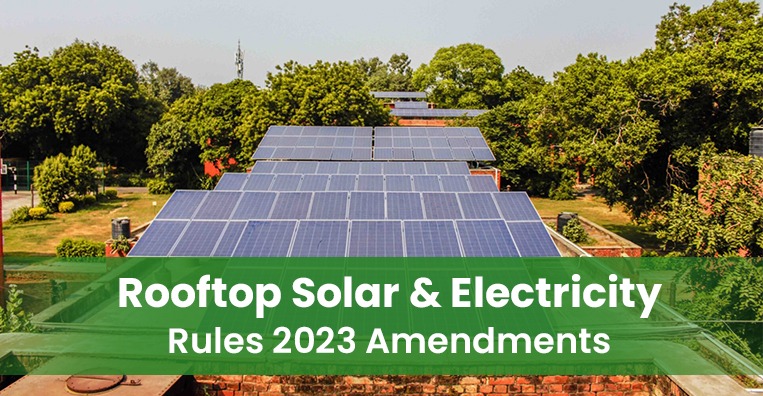
The Ministry of Power has recently introduced the draft Electricity (Rights of Consumers) Second Amendment Rules 2023, marking a significant step in reshaping the regulatory framework pertaining to the rights of electricity consumers.
Upon the implementation of the proposed amendments, Distribution Companies (DISCOMs) are instructed to streamline and expedite the application processes for various consumer-centric initiatives. These amendments particularly target the acceleration of procedures related to rooftop solar installations, metering setup, and the duration of feasibility studies. The overarching goal is to encourage and facilitate the adoption of rooftop solar energy solutions among consumers, aligning with broader sustainability objectives.
In a commitment to fostering a comprehensive and inclusive decision-making process, the Ministry of Power has opened the floor for public input. All stakeholders, including consumers, industry experts, and advocacy groups, are urged to contribute their insights and opinions on the proposed amendments. This collaborative approach seeks to gather diverse perspectives and refine the rules to better cater to the needs and expectations of all involved parties.
To facilitate this engagement, the ministry has established a 30-day window, concluding on January 12, 2024, during which stakeholders can submit their comments and feedback. This time frame allows for a thorough and thoughtful review of the draft rules, ensuring that the final regulations reflect a balanced and well-informed approach to addressing the evolving landscape of electricity rights for consumers.
This collaborative effort serves as a model for inclusive governance and sets the stage for a more consumer-centric and sustainable energy future.
New Connection Or Modification of Existing Connection
A significant modification is observed in Rule 4 of the Electricity (Rights of Consumers) Rules 2020, particularly within sub-rule (11). This amendment grants authority to the regulatory commission to define a maximum timeframe. This period should not exceed three days in metropolitan cities, seven days in other municipal areas, and 15 days in rural regions. Within this stipulated time, distribution licensees are mandated to provide new connections or make modifications to existing ones upon receipt of a comprehensive application.
If the extension of distribution mains or the commissioning of new substations is necessary to facilitate the provision of electricity, DISCOMs are obligated to promptly deliver electricity upon the completion of such projects or within a timeframe stipulated by the commission.
The amendment places additional emphasis on ensuring the provision of individual electricity connections for owners or occupants within Group Housing Societies, residential colonies, Resident Welfare Associations (RWAs), or analogous registered bodies.
The regulations specify terms for delivering electricity through a single-point connection for Group Housing Societies, residential colonies, RWAs, or comparable registered entities. The charges for electricity from individual users in these setups must not exceed the retail tariff set by the regulatory commission for that particular consumer category.
EV Charging System Connections
One noteworthy addition in the revised regulations caters to the escalating demand for electric vehicle (EV) charging infrastructure. These amendments stipulate that the distribution licensee is obligated to provide a distinct connection for the provision of electricity to EV charging systems, as and when requested by individual consumers or registered entities.
This pivotal modification reflects a proactive response to the surging popularity of electric vehicles and the imperative to build a robust charging infrastructure. It underscores a commitment to facilitating the integration of EVs into the mainstream by ensuring that consumers and organizations can easily access the necessary electric supply infrastructure for their charging needs.
Meter Testing
The regulations establish a specific timeframe for meter testing, mandating Distribution Companies (DISCOMs) to carry out these tests within a period outlined by the commission. This duration should be at most 30 days from the time DISCOMs receive complaints from consumers regarding meter readings.
If consumers notice differences between the meter readings and their actual electricity usage and report it, distribution companies (DISCOMs) are required to install an extra meter within three days of receiving the complaint. This additional meter is put in place to validate the consumption for a duration determined by the commission, which should not be less than three months.
These proposed changes aim to introduce transparency, efficiency, and consumer-friendly practices to the electricity distribution sector in India. During the comment period, stakeholders and the public are invited to share their valuable input. This participation will significantly influence the formulation of rules that are set to have a crucial impact on the future of India’s electricity distribution landscape.
Consumers As Power Generators
Distribution Companies (DISCOMs) are required to conduct a technical feasibility study for rooftop solar projects within a designated period, which should not extend beyond 15 days. The findings of the study must be promptly communicated to the applicant. It’s important to note that the installation of rooftop solar systems up to a capacity of 10 kW is exempt from the mandatory technical feasibility study.
Refer the official document for more details: https://drive.google.com/file/d/1RNa-xNK8QyIC1nLprA7Ep1UUmR9wUiKv/view






Leave a Reply